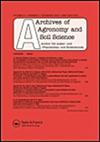Soil Diseases Suppressiveness Conferred by Organic Farming, Practices and Microbial Metabolites
IF 1.8
4区 农林科学
Q1 AGRONOMY
引用次数: 0
Abstract
ABSTRACT A major obstacle to the creation of efficient biobased disease management practices continues to be the poor integration of traditional agricultural practices and cutting-edge technical approaches. The present review will expand the understanding of organic amendments and metabolites-mediated microbial community metabolism and their mechanistic aspects in disease-suppressive soil (DSS). Organic amendments have been shown to promote the biocontrol potential of resident soil microbiota. Organic amendments positively affect the labile carbon, cation exchange content (CEC) and microbial enzymatic activity. DSS is considered a rich source of beneficial soil microbial community that produces a plethora of antibacterial metabolites. Multiple gene clusters associated with known metabolites offer mechanistic insights associated with disease-suppressive phenotypes. Organic amended soil has higher abundance of chemotaxis genes. Several strains of Bacillus and Pseudomonas produce key metabolites, phenazines, 2,4-diacetylphloroglucinol, pyoluteorin, pyrrolnitrin, cyclic lipopeptides and volatile organic compounds in DSS. High-resolution metagenomics combined with bioinformatics tools would be instrumental in the identification of biomarkers associated with suppressive soils. The integration of traditional and genomic approaches can be employed to infer the untapped potential of resident soil microbiomes.有机农业、实践和微生物代谢产物对土壤病害的抑制作用
摘要:传统农业实践与尖端技术方法的结合不足仍然是建立有效的生物疾病管理实践的一个主要障碍。本综述将扩大对有机改良剂和代谢物介导的微生物群落代谢及其在抑病土壤(DSS)中的机制方面的理解。有机改良剂已被证明可以提高常驻土壤微生物群的生物控制潜力。有机改良剂对不稳定碳、阳离子交换含量(CEC)和微生物酶活性有积极影响。DSS被认为是有益土壤微生物群落的丰富来源,可产生大量抗菌代谢产物。与已知代谢产物相关的多个基因簇提供了与疾病抑制表型相关的机制见解。有机改良土壤具有较高的趋化性基因丰度。芽孢杆菌和假单胞菌的几种菌株在DSS中产生关键代谢产物,吩嗪、2,4-二乙酰基氯三酚、绿脓杆菌素、吡咯腈、环状脂肽和挥发性有机化合物。高分辨率宏基因组学与生物信息学工具相结合将有助于识别与抑制性土壤相关的生物标志物。传统方法和基因组方法的结合可以用来推断居民土壤微生物群尚未开发的潜力。
本文章由计算机程序翻译,如有差异,请以英文原文为准。
求助全文
约1分钟内获得全文
求助全文
来源期刊

Archives of Agronomy and Soil Science
AGRONOMY-SOIL SCIENCE
CiteScore
5.50
自引率
4.20%
发文量
107
期刊介绍:
rchives of Agronomy and Soil Science is a well-established journal that has been in publication for over fifty years. The Journal publishes papers over the entire range of agronomy and soil science. Manuscripts involved in developing and testing hypotheses to understand casual relationships in the following areas:
plant nutrition
fertilizers
manure
soil tillage
soil biotechnology and ecophysiology
amelioration
irrigation and drainage
plant production on arable and grass land
agroclimatology
landscape formation and environmental management in rural regions
management of natural and created wetland ecosystems
bio-geochemical processes
soil-plant-microbe interactions and rhizosphere processes
soil morphology, classification, monitoring, heterogeneity and scales
reuse of waste waters and biosolids of agri-industrial origin in soil are especially encouraged.
As well as original contributions, the Journal also publishes current reviews.
 求助内容:
求助内容: 应助结果提醒方式:
应助结果提醒方式:


